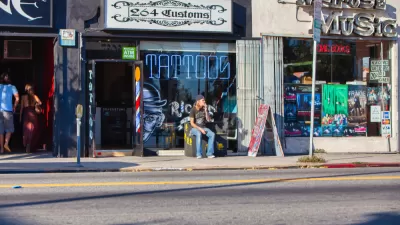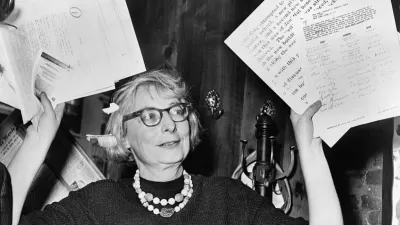If Jane Jacobs's theory that face-to-face encounters make for better cities is correct, a new metric that measures the ability of a city to encourage random social interactions could prove essential in shaping urban policy.
"In a pair of recent papers, Steven Farber, an assistant professor of geography at the University of Utah, and his collaborators have proposed a new metric to measure the latent possibilities for community in cities without proximity: 'social interaction potential,' ” reports Greg Lindsay. "SIP represents the intersecting slivers of space-time in which any random pair of a city’s residents can meet based on where they live, where they work, and, given those, how long they have to rendezvous."
"The usefulness of the metric depends on linking face-to-face encounters with higher quality of life and economic growth--which, given the rich body of literature on the subject from Jane Jacobs’s The Economy of Cities onward, seems likely."
FULL STORY: The Best Cities Are Ones Where You Can Make Friends

Planetizen Federal Action Tracker
A weekly monitor of how Trump’s orders and actions are impacting planners and planning in America.

Map: Where Senate Republicans Want to Sell Your Public Lands
For public land advocates, the Senate Republicans’ proposal to sell millions of acres of public land in the West is “the biggest fight of their careers.”

Restaurant Patios Were a Pandemic Win — Why Were They so Hard to Keep?
Social distancing requirements and changes in travel patterns prompted cities to pilot new uses for street and sidewalk space. Then it got complicated.

Platform Pilsner: Vancouver Transit Agency Releases... a Beer?
TransLink will receive a portion of every sale of the four-pack.

Toronto Weighs Cheaper Transit, Parking Hikes for Major Events
Special event rates would take effect during large festivals, sports games and concerts to ‘discourage driving, manage congestion and free up space for transit.”

Berlin to Consider Car-Free Zone Larger Than Manhattan
The area bound by the 22-mile Ringbahn would still allow 12 uses of a private automobile per year per person, and several other exemptions.
Urban Design for Planners 1: Software Tools
This six-course series explores essential urban design concepts using open source software and equips planners with the tools they need to participate fully in the urban design process.
Planning for Universal Design
Learn the tools for implementing Universal Design in planning regulations.
Heyer Gruel & Associates PA
JM Goldson LLC
Custer County Colorado
City of Camden Redevelopment Agency
City of Astoria
Transportation Research & Education Center (TREC) at Portland State University
Camden Redevelopment Agency
City of Claremont
Municipality of Princeton (NJ)





























